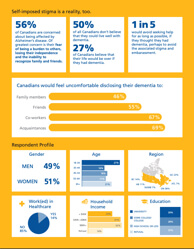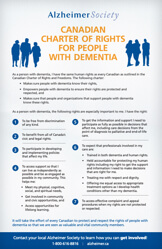How you can help
Learn
Thank you for taking the time to learn more. Living with Alzheimer’s disease or another form of dementia is unique to every individual and their families. What can you do? Keep reading to learn more and help make your community more dementia-friendly.
-

-
Communication
Respectful, sensitive communication is the key. Be supportive and use things that are familiar to the person to create a reassuring environment. If their perception of reality becomes confused, try to be creative rather than contradictory in your responses.
-

-
Behaviour
How dementia affects behaviour varies from person to person and these symptoms can change over time. Always try to remain calm and reassuring, and never judge or scold. Your local Alzheimer Society can provide information and strategies to help you understand and respond to various behaviours.
-

-
Safety
We all have an important role to play in making our communities safe for people with dementia. Having dementia presents challenges, but there are things we can all do to manage the risks and promote safety at home and in the community.
-

-
Myths and realities
Myths and misconceptions about Alzheimer's disease abound - what it is, who gets it, and how it affects the people who have it. These myths stand in the way of understanding the disease and helping those affected.
Stigma survey results
-

-
We surveyed over 1,500 Canadians to measure their attitudes and perceptions of Alzheimer's and dementia. Read our infographic summarizing the results.
The Charter
-

-
The Canadian Charter of Rights for People with Dementia defines seven explicit rights to empower Canadians with dementia to advocate for themselves, while also ensuring that the poeple and organizations that support them know and protect their rights. Take a moment to learn about each of the Charter rights.
